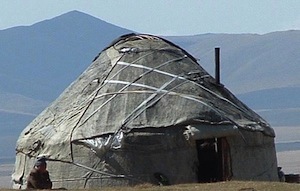
Did you know people in Haiti, Burma and Armenia are all better off than in Britain? And the Congo is happier than the USA? That’s what the London think-tank New Economic Foundation reckons in its second “Happy Planet” rankings. But even NEF admits that its “happiness” rating or HPI doesn’t really measure human happiness, and that it’s sacrificing truthiness for the publicity its reports can generate.
Like the notorious Carbon Calculator, the Happy Planet Index is an advocacy tool for limiting, rather than promoting, human health and happiness, and it too is based on the idea of an ecological “footprint”. This Neo-Malthusian concept was developed by population-control advocate William Rees, a professor at British Columbia University, and his splendidly-named pupil Mathis Wackernagel. The latter has since turned it into a successful consultancy business.
NEF uses older surveys where people expressed happiness, multiplies it by life expectancy, and divides it by the “footprint”. Factors such as crime, freedom, or infant mortality rates are not considered.
So not surprisingly, given this skew, the “Happiness Index” produces some very odd results. The last survey was topped by the Republic of Vanautu. The south sea nation has a population of just over 200,000 and an infant mortality rate of one in 20 – about 10 times that of the UK.
The authors urge industrialised economies urgently need to become more like the underdeveloped. In human terms, that would mean over 300,000 unnecessary child deaths in the UK each year. Such is the price of happiness, NEF argues.
NEF also frowns on India and China for improving the material welfare of their people. Accompanying the report is a spreadsheet which hindcasts the NEF “happiness” figure retrospectively. It tells us that since 1990, China and India’s “HPI rating” has fallen.
In the latest survey Costa Rica tops the poll, and Vanautu has dropped out completely. Jamaica ranks third, Columbia is at six, Bhutan (with 74 deaths per 1,000 live births) and Laos (89 per 1,000) is in the Top 20 – far higher than any OECD country.
It’s too bizarre even for some anti-capitalist environmentalists. Writing on his blog, the activist Derek Wall, author of Babylon and Beyond: The Economics of Anti-capitalist, Anti-globalist and Radical Green Movements observes that:
“Colombia comes in at number six on the index out of 143 countries… yet death squads commonly clear peasants from the land for biofuels. Doesn’t sound that good a place to me.”
“But maybe I am just one of those old fashioned left greens who worries about little things like human rights and the environment?”
Meet the Carbon Cult, Derek.
Read more






